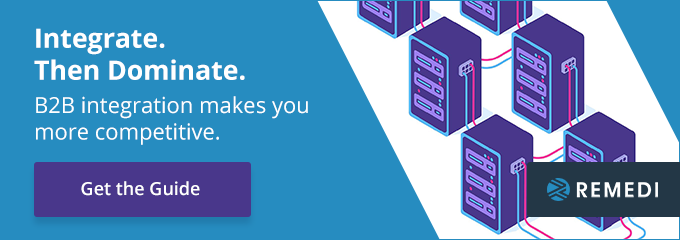
Over the past several years, “digital transformation” has become something of a buzzword – so much so, people don’t quite understand what it means or how it's relevant to them. However, digital transformation is critical to stay competitive, relevant, and agile in today’s business environment. APIs represent an essential tool for digital transformation.
In this post, we’ll explore what APIs are, how and why they’re essential to modern integration, and their role in digital transformation. Are You Ready to integrate?
What Are APIs?
APIs stand for application programming interfaces. Think of an API as an electrical outlet. An electrical outlet lets you consume a service by plugging in a device.
In the case of APIs, they let you consume information through an application. They deliver data so that an application can use it – much as an electrical socket enables device operation.
What Is Digital Transformation?
Digital transformation means that technology integrates into all areas of a business. Such integration fundamentally changes processes, so they're more efficient and create greater value.
Because digital transformation has become so widely misunderstood, many business leaders believe that they can simply implement a technological solution, and they've embarked on a digital transformation. That's not the case. If you don't see processes change (and change for the better), you haven't brought about a digital transformation.
"Digital transformation means technology integrates into all areas of the business for fundamental process change."
Here's what you should remember about digital transformation: it won't look the same in every organization, and it's not one-size-fits-all. A digital transformation at one organization may look completely different than one at another business. The dramatic, positive change in processes matters most.
Why does the concept of digital transformation matter so much now? The global pandemic in 2020 forced companies to digitize much faster than they had originally planned. They realized that their competitors who had already embarked on a digital transformation were positioned to handle the global business environment's uncertainties.
APIs vs. EDI Software, or APIs and EDI Software?
When it comes to the subject of APIs and EDI software, the question always comes up: "Are APIs better than EDI software? Are they going to replace EDI software?"
The answers are "no" and "no." APIs and EDI software aren't mutually opposing technologies. On the contrary, they work together to drive improved business results.
APIs and EDI Software: Better Together
APIs and EDI software complement one another. Each possesses strengths and weaknesses.
| API Strengths | API Weaknesses |
|
|
| EDI Software Strengths | EDI Software Weaknesses |
|
|
APIs and EDI software fill in each other’s gaps. Where EDI software can’t handle real-time transactions, APIs call up information to give users updates on order statuses. Moreover, APIs make it faster to onboard new partners to EDI systems.
How APIs Are Essential to Modern Integration
APIs are essential to modern integration. Integration today has become more complex: there are more information sources from which to draw, and there are more partners with whom to integrate. In addition, the need for real-time information has never been greater; if there’s a problem in your manufacturing plant halfway around the world, you need to know about it now.
Here’s what APIs can do to enable modern integration:
- Real-time information transfer
- Simplified partner onboarding
- Connectivity to online marketplaces
- Connectivity to new information sources
Real-Time Information Transfer
One of the most significant benefits of APIs is real-time information transfer. As mentioned earlier, EDI software can’t provide real-time information transfer – its specialty is processing large batches of information. With EDI software, you can’t find information on a single order.
However, the combination of APIs and EDI software does allow you to gain information in real-time. For example, if a customer contacted you about when he could expect his order of ball bearings, you could look that up quickly with APIs.

Simplified Partner Onboarding
Raise your hand if you’ve ever had your partners (or your colleagues) complain about how long the onboarding process takes and how complex it is. You’ve most likely responded how much you’d like to make things simpler, but you don’t know how; until now.
APIs simplify partner onboarding by sharing information between businesses and their trading partners. Because they can transmit data accurately and quickly, the onboarding process becomes much shorter. In turn, that allows business processes to move faster – the partner can start ordering from you or start selling to you sooner.
Connectivity to Online Marketplaces
Today, consumers aren’t the only ones buying from Amazon or Walmart’s online marketplaces. B2B buyers can also take advantage of the convenience of ordering online. Connectivity to online marketplaces for B2B buyers is known as B2B connectivity, and B2B connectivity is possible through a combination of EDI software and APIs.
EDI software serves as a backbone between the buyer’s procurement systems and the seller’s systems. APIs enable the buyer to ask questions in real-time, such as queries about order status. Moreover, APIs are “light” enough to run on mobile devices, whereas EDI software can’t.
Connectivity to New Information Sources
To understand what’s going on in your supply chain, you can access systems of record such as ERPs and order fulfillment systems. Plus, there are new streams of information in the enterprise, such as sensors from networked devices and data from mobile devices. The information streams are just as valuable as those from more traditional sources.
EDI software can’t connect to newer streams, although APIs can. With APIs, you won’t miss out on critical developments in your supply chain (such as a delayed shipment or damaged raw materials).
APIs: Essential to Digital Transformation
Now that we’ve explained how APIs are crucial for modern integration let’s explore why they’re essential to digital transformation.
As we mentioned earlier, digital transformation involves using technology to alter processes dramatically so they’re more efficient and create greater value. APIs do just that – they facilitate more efficient processes that drive greater value.
“APIs facilitate more efficient processes that drive greater value.”
How can APIs enable your digital transformation?
- They make it easier to do business with your company
- They allow you to address issues faster
- They help you stay relevant in a rapidly changing business environment
APIs Make It Easier to Do Business with Your Company
Let’s revisit the issue of onboarding for a moment. As we mentioned earlier, onboarding new partners to your EDI system used to be a frustrating, time-consuming task. APIs make partner onboarding faster and easier, making your company more attractive for those looking to work with you.
Additionally, offering B2B connectivity gives customers another channel from which to purchase. Being able to buy what they need online makes it more convenient to do business with you.
APIs Allow You to Address Issues Faster
To show how APIs allow you to address issues faster, we’ll illustrate with an example. Let’s say you purchase some raw materials for a popular product you manufacture. Two days after placing the order, you use APIs to run a query about the order status. That’s when you discover there’s a significant delay in your order of raw materials, which could cause a severe delay to your product shipments.
With this knowledge, you can find another supplier who has the materials you need in stock and can expedite a shipment. You complete your orders on time, so your customers get what they want.
APIs Help You Stay Relevant in a Rapidly Changing Business Environment
When it’s easy to do business with your company, and your company can react quickly to issues in the supply chain, you have a greater sense of security that you can stay relevant into the future.
The year 2020 taught us some painful yet valuable lessons. One lesson for businesses was that digital transformation can’t be ignored or put off longer; companies that had a strong digital infrastructure in place (including a solid API strategy) were able to adapt to lockdowns and business closures. A digital transformation allows you to pivot quickly and meet your customers’ needs despite challenging situations. That flexibility enables you to stay relevant and sustainable in an uncertain business environment.
Digital transformation (including a solid API strategy) helps companies stay relevant and sustainable)
Combining APIs with your EDI system gives you a competitive edge and also helps you serve customers better. Integrate. Then Dominate.




